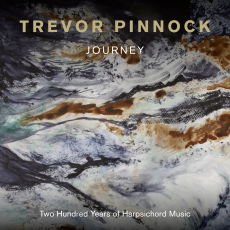Trevor Pinnock - Journey - MusicWeb International
The
journey in the title is twofold: inspired by the travels of Antonio Cabezón,
the sixteenth-century organist and composer whose variations on a popular tune
open the programme, Trevor Pinnock weaves a path not only through Cabezón's
life but also through his own enviable career. Cabezón and Domenico
Scarlatti bookend the album - from a Spanish composer who travelled, to an
Italian who settled in Spain - with Sweelinck's Variations on Mein junges Leben hat ein End at its heart. Cabezón's journey
was matched by a much shorter one for the young Pinnock, to the house of
pianist Ronald Smith and eventually to his being tutored there by Smith's
sister, June. Being born in Canterbury certainly had its advantages.
I have already alluded to the Sweelinck in my
recent review of the Glossa 6-CD set of that composer's complete keyboard music.
As I noted there, it's six of one and half-a-dozen of the other in terms of
performance. Pieter Dirksen on Glossa has the considerable advantage of
our having heard the tune on which the variations are based immediately before
his performance, something which would hardly have been feasible for
Linn. Pinnock also plays the work noticeably faster but the chosen tempi
suit the different instruments: Dirksen on the more intimate virginal, Pinnock
on the harpsichord.
Of necessity only one instrument is used
throughout the programme but it suits the very wide chronological range of the
music very well, with appropriate registration for the earlier music.
Re-tuning would have been required at some stage: the earlier pieces are played
in meantone temperament and there's a variety of unequal temperaments for the
rest of the programme.
It would be pointless to compare the performances
with those on other recordings: there's no comparable programme and, even if
there were, many would want to have this SACD as a celebration of Pinnock's 70th birthday. Maybe
the Sweelinck work is significant in that we septuagenarians cannot refer to
our junges Leben anymore, but I hope that it's not the
end of his journey - or mine. I need hardly say that the playing is as
brilliant as ever it was: you would hardly know that much of what we hear is
technically very difficult and all the performances are well suited to the tone
of the music. The photographs on pages 8 and 14 show a much older Trevor
Pinnock than of yore but the first reminds us of his thoughtful approach to the
music - try the Bach - and the second of the sheer joie de vivre that his playing can still evoke, as
in the Scarlatti works which close the recital.
Trevor Pinnock refers in the notes to his
friendship with Rafael Puyana and, while I'm sure that his instrument is not
the kind of monster that Puyana used to play, his performance of the Scarlatti
reminds me of the sheer abandon of the latter's playing without its excesses.
The recording is very good, as heard from the
stereo SACD layer, and the notes are excellent. As usual from me, a short
review betokens a strong recommendation.

